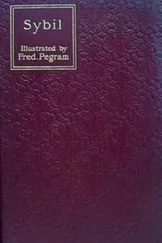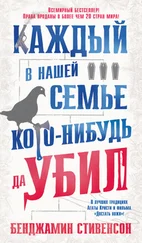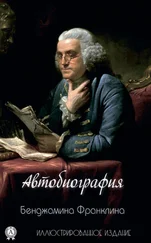They sit on the deck. Even in December, the garden is lush. There are jade and nasturtiums and California poppies, all hearty enough to grow amidst fog. It occurs to Simon that he would like to have a life like this: a career, a house, a partner. He’s always assumed that these things are not for him – that he’s designed for something less lucky, less straight. In truth, it is not only Simon’s gayness that makes him feel this way. It’s the prophecy, too, something he would very much like to forget but has instead dragged behind him all these years. He hates the woman for giving it to him, and he hates himself for believing her. If the prophecy is a ball, his belief is its chain; it is the voice in his head that says Hurry , says Faster , says Run .
Robert says, ‘I got the place.’
Last week, he applied for an apartment on Eureka Street. It’s rent controlled, with a kitchen and a backyard. Simon went to the showing with Robert and marveled at the dishwasher, the washing machine, the bay windows.
‘You get a roommate?’ he asks.
The nasturtiums wave their festive red and yellow hands. Robert leans back on his forearms, grinning. ‘You want to room with me?’
The thought is bewitching: a tingle runs across Simon’s scalp. ‘We’d be close to the studio. We could get a used car and drive to the theater together on performance days. We’d save gas.’
Robert looks at Simon like he’s just said he’s straight. ‘You want to live together to save gas.’
‘No! – No. It’s not the gas. Of course it isn’t the gas.’
Robert shakes his head. He’s still smiling when he looks at Simon. ‘You can’t admit it.’
‘Admit what?’
‘How you feel about me.’
‘Sure I can.’
‘Okay. How do you feel about me?’
‘I like you,’ says Simon, but it comes out a little too fast.
Robert throws his head back and laughs. ‘You are a bad fucking liar,’ he says.
7.
They are unpacking the apartment, Simon and Robert and Klara, who didn’t mind the move; she seemed relieved to have the Collingwood apartment to herself. After a balmy December, temperatures have dipped into the forties. This would be nothing in New York, but California has made Simon soft: he wears legwarmers under his tracksuit as he runs between the apartment and the U-Haul. When Klara leaves, Simon and Robert kiss pressed up against the dishwasher: Robert’s hands sure on Simon’s waist, Simon groping for Robert’s ass, his dick, his magnificent face.
It is 1980, the beginning of a new decade as well as a new year. In San Francisco, Simon is insulated from the global recession and the Soviet invasion of Afghanistan. He and Robert pool their money to buy a TV, and though the evening news makes them uneasy, the Castro is like a fallout shelter: there, Simon feels powerful and safe. He rises through the ranks at Corps, and by spring, he is a full company member instead of an understudy.
Klara has returned to the dentist’s office, working days as a receptionist and nights as a restaurant hostess in Union Square. She spends weekends scripting her show and puts each month’s sliver of leftover income into savings. On Sundays, Simon meets her for dinner at an Indian restaurant on Eighteenth Street. One evening, she brings a manila folder, rubber-banded twice and stuffed with photocopies: grainy black-and-white photos, old newspapers, vintage programs and ads. She uses the full length of their table to lay everything out.
‘This,’ she says, ‘is Gran.’
Simon leans over the table. He recognizes Gertie’s mother from the photo tacked above Klara’s bed. In one image, she stands with a tall, dark-haired man on top of a galloping horse, stocky in her shorts and tied-off Western blouse. In another, the cover of a program, she is tiny-waisted and teeny-footed. She lifts the lip of her skirt with one hand; with the other, she walks six men on leashes. Below the men are the words, ‘The QUEEN of BURLESQUE! Come see Miss KLARA KLINE’S muscles shake and shiver like a BOWL of JELLY in a GALE of WIND – the DANCE that John the Baptist LOST HIS HEAD over!’
Simon snorts. ‘That’s Ma’s mom?’
‘Yup. And that,’ says Klara, pointing to the man on the horse, ‘is her dad.’
‘No shit.’ The man isn’t quite handsome – he has thick, mustache-like eyebrows and Gertie’s large nose – but he has a glowering sort of charisma. He looks like Daniel. ‘How do you know?’
‘I’ve been researching. I couldn’t find her birth certificate, but I know she arrived at Ellis Island in 1913 on a ship called the Ultonia . She was Hungarian; I’m pretty sure she was an orphan. Aunt Helga arrived later. So Gran came with a girl’s dance troupe and lived in a boarding house: the De Hirsch Home for Working Girls.’
Klara picks up a piece of paper on which several pictures have been photocopied: a large stone building, a dining hall full of seated, brown-haired girls, and the portrait of a severe-looking woman – the Baroness de Hirsch, reads the caption – in a high-necked blouse, gloves, and square hat, all of them black.
‘I mean, God knows – Gran was Jewish, and she had no family. If it weren’t for the home, she’d’ve probably been on the street. But this place was really proper. It taught all the girls to sew, get married young, and Gran wasn’t like that. At some point, she left, and that’s when she started doing this.’ Klara fingers the burlesque program. ‘She got her start in vaudeville. She performed in dance halls, dime museums, amusement parks – nickel dumps, too, which is what they called movie theaters. And then she met him.’
Carefully, she lifts a page hidden under the program and passes it to Simon. It’s a marriage certificate.
‘Klara Kline and Otto Gorski,’ says Klara. ‘He was a Wild West rider with Barnum & Bailey, a world champion. So here’s my theory: Gran met Otto on the way to a gig, fell in love and joined the circus.’
Klara pulls a folded piece of paper out of her wallet. It’s another picture, but this one shows Klara Sr. sliding from the top of the circus tent to the bottom, suspended only from a rope that she holds in her teeth. Below the photo is a caption: Klara Kline and her Jaws of Life!
‘Why are you showing me all this?’ asks Simon.
Klara’s cheeks are pink. ‘I want to do a combination show: mostly magic, plus one death-defying feat. I’m teaching myself the Jaws of Life.’
Simon stops chewing his vegetable korma. ‘That’s nuts. You don’t know how she did it. There must have been some trick.’
Klara shakes her head. ‘No trick – it was real. Otto, Gran’s husband? He was killed in a riding accident in 1936. After that, Gran moved back to New York with Ma. In 1941, she did the Jaws of Life across Times Square, from the Edison Hotel to the roof of the Palace Theater. Halfway through, she fell. She died.’
‘Jesus Christ. Why didn’t we know about this?’
‘Because Ma never talked about it. It was a pretty big story back then, but I think she’s always been ashamed of Gran. She wasn’t normal,’ says Klara, nodding at the photo of Gertie’s mother on the horse, a denim shirt hiked up to reveal her muscular stomach. ‘Besides, it was such a long time ago – Ma was only six when she died. After that, Ma went to live with Aunt Helga.’
Simon knows Gertie was raised by her mother’s sister, a hawkish older woman who spoke mostly Hungarian and never married. She came to 72 Clinton on Jewish holidays, bringing hard candies wrapped in colored foil. But her nails were long and pointed, her smell was that of a box unopened for decades, and Simon was always afraid of her.
Now he watches Klara put the photocopies back in her folder. ‘Klara, you can’t do this. It’s insane.’
Читать дальше
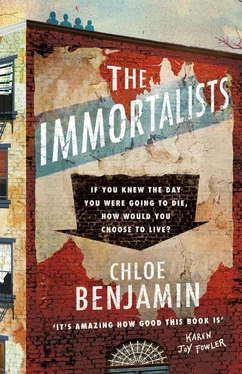

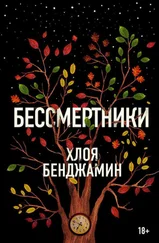

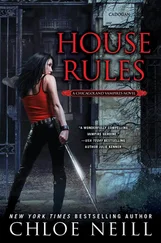
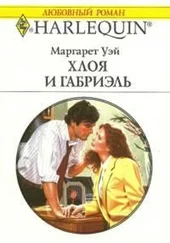


![Мелани Бенджамин - Госпожа отеля «Ритц» [litres]](/books/384861/melani-bendzhamin-gospozha-otelya-ritc-litres-thumb.webp)
